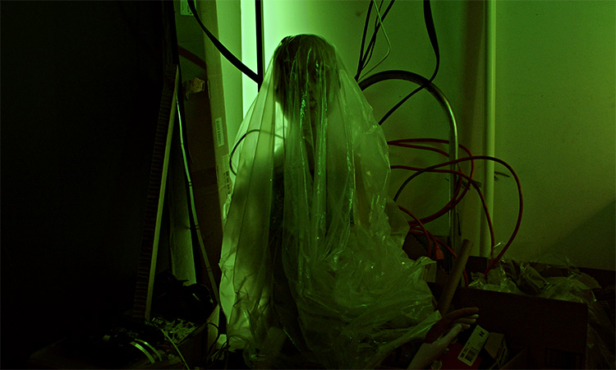Special Agent Deena Helms (Sinda Nichols) enters a bare office – more an interrogation room – in the basement of the Florida building where she works, dictates some business messages to Siri on her laptop, and then pauses for a moment of reflection. “Hey Siri, how do you know if you’re doing the right thing?”, she asks. “What do you believe is the difference between right and wrong?” The virtual assistant does not understand the question and has no answer, but this opening scene to The Artifice Girl carefully lays out what will become the film’s central theme. For this is a story that raises thorny moral issues – of exploitation and entrapment, of identity and oppression – precisely at the interface of humanity and artificial intelligence.
In the first of three sections, Deena and her fellow agent Amos (David Girard), both investigators of sex crimes against children, bring in Gareth (played by writer/director Franklin Ritch) for questioning. Part of the contents of Gareth’s computer have been leaked to their organisation, leading them to suspect that this hyper-intelligent loner with a background in VFX, 3D modelling and computer programming is part of a paedophile ring – and they are particularly alarmed by a photo, found in his files, of young Cherry (Tatum Matthews), not least because she is an active presence in numerous illicit chatrooms, but they have no idea who – or where – she is. In fact neither Gareth nor Cherry is quite who they seem, and by the end of this encounter, all four of these characters will form a secret unit – the ‘Cherry team’ – that will change the course not just of their own lives, but of all humankind.
Confined almost entirely to single-room sets, observing a formally headed three-act structure and full of people (and a person-like thing) talking, The Artifice Girl comes with an overt theatricality that allows it to foreground character and concept while thankfully keeping the workings of online predators and traffickers off screen. At the film’s heart is an accidental singularity, as a technology developed for the sole purpose of hunting and entrapping paedophiles rapidly evolves into a superintelligence, leaving its handlers unsure whether they should simply go on using it as a machine, or stop objectifying it and start affording it rights, freedoms and the power of consent – which is after all what they are fighting to protect in children. Meanwhile, as the AI proves as adept at deceit as the humans, and is as bound by its primary directives as its creator is driven by formative trauma, it becomes unclear just who is the puppet and who the master, who is more robotic and who more human, with means repeatedly being justified by ends.
In the first act Gareth channels the appearance and mannerisms of Domnhall Gleeson’s character from Alex Garland’s Ex Machina (2015), who is witness to an emerging singularity; by the second act Gareth has become a close study of Mark Zuckerberg, whose current work is supposedly shepherding in the metaverse; and in the third and final act, the much older, wheelchair-bound Gareth is now played by Lance Henriksen who, while playing a game of chess with Cherry, declares, “I’m not trading bishops this time”, in a pun on his rôle as the similarly named android in James Cameron’s Aliens (1986). There are also evocations of Isaac Asimov’s Laws of Robotics, Stephen Spielberg’s A.I. Artificial Intelligence (2001), Matthew Leutwyler’s Uncanny (2015), and of course Steve De Jarnatt’s Cherry 2000 (1988).
All these references open up a nexus of associations: a dynamic negotiation between fleshy, embodied humans, sophisticated software, mechanised frames and code that is mathematically precise if not always moral. Yet here Deena’s opening questions about right and wrong are always part of the conversation, as Ritch’s speculative scenarios get the viewer thinking hard about the ethics of our uncharted, exponential rush to embrace artificial intelligence.
The Artifice Girl is available now on digital platforms from Vertigo Releasing
